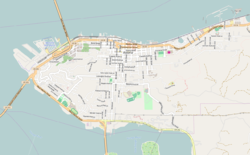Clatsop County Courthouse | |
 The Clatsop County Courthouse in 2010 | |
| Location | 749 Commercial Street Astoria, Oregon |
|---|---|
| Coordinates | 46°11′20″N123°50′07″W / 46.188783°N 123.835192°W |
| Area | Less than 1 acre (0.40 ha) [1] |
| Built | 1908 [1] |
| Built by | Hastie & Dougan [1] |
| Architect | Edgar M. Lazarus [1] |
| Architectural style | American Renaissance [1] [2] |
| Part of | Astoria Downtown Historic District [2] (ID98000631) |
| NRHP reference No. | 84002954 |
| Added to NRHP | April 5, 1984 |
The Clatsop County Courthouse is a historic courthouse in Astoria, Clatsop County, Oregon, United States. [1] The building was listed on the National Register of Historic Places in 1984. [3]


